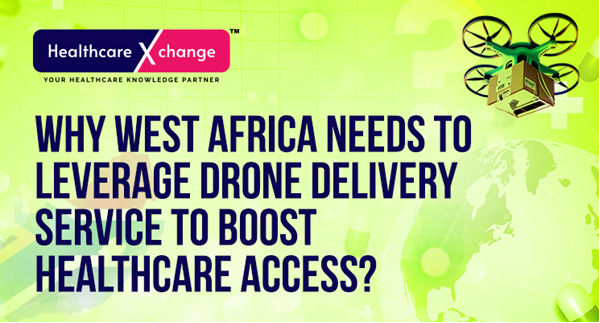
Why West Africa Needs to Leverage Drone Delivery Service to Boost Healthcare Access?
- Healthcare and General Service
- October 14, 2024
Highlights
-
Drone delivery has boosted access to crucial medical supplies such as vaccines and medicines in remote parts of Ghana
-
Service has reduced incidents of stock-outs and gaps in vaccination programmes
-
Drone service provides prompt access to medical facilities while circumnavigating geographical obstacles and storage-related challenges
West Africa is a region of diverse landscapes, encompassing the arid Sahel in the north, dense forests in the central areas, and low coastal plains to the south. The region’s geography has impeded delivery of healthcare services to populations inhabiting remote areas. Countries such as Niger, Mali plus Nigeria have encountered roadblocks in implementing Universal Health Coverage (UHC) schemes across all provinces.
Medical drone delivery
Ghana has emerged to be a shining beacon in providing healthcare access to all corners of the country with its unique drone delivery programme. The service aims to deliver healthcare supplies to isolated communities residing in inaccessible areas especially in the north-western parts of the country.
Drone delivery system functions through a network of logistic facilities for prompt delivery of vital healthcare products. A hub-and-spoke model with six central locations situated at strategic areas covers the length and breadth of the country. A single hub can potentially cover as many as 400 health centres spread across 19 districts.
Prompt access to vital medical supplies
Network enables timely access to crucial medical products such as vaccines, clinical drugs, laboratory reagents, diagnostic kits and packed red blood cells for transfusion. The drone service has carried out more than 370,000 medical deliveries to 2,700 clinics across the country benefitting approximately 25 million people so far.
For instance, the Government of Ghana has tied up with the UPS Foundation along with Zipline to provide about 2.5 million COVID-19 vaccine doses. The facility has delivered over one million doses till date to secluded locations without cold storage facilities.
According to the World Bank around 41% percent of Ghanaians live in rural areas with higher susceptibility to infectious diseases than the urban population. The programme serves as a lifeline for rural communities who otherwise face an arduous trek to healthcare centres in urban areas to access primary or specialised medical facilities. The results are apparent with the immunisation rates significantly higher in remote areas without proper roadways in the country’s north-west in the post COVID-19 era.
For example, the drive from Sefwi-Wiawso, a town in the North-Western Ghana to the Asawinso Health Centre, situated in a heavily forested region, takes at least an hour during good weather. The situation is exacerbated in the rainy season with the journey taking several hours.
However, with Zipline’s drones flying at top speeds of 128km per hour and a range of 160km, the same trip takes just 23 minutes. The drones come equipped with advanced autonomous navigation systems to circumvent any potential barriers and land with pinpoint precision. Each drone can make up to 100 deliveries in a single day.
Pandemic risk mitigation
Rapid delivery of lifesaving drugs and vaccines enables healthcare workers to make real-time interventions. The feature is invaluable when it comes to containing potential outbreaks of infectious diseases before the situation acquires a pandemic level of threat. In fact, Gavi, the vaccine alliance has coordinated with Zipline and Ghana’s government to deliver vaccines for a host of illnesses.
The statistics support the programme’s efficacy in both healthcare services as well as supply chains.
The drone delivery service has,
-
Reduced vaccine stock-outs by 60%
-
Prevented missed immunisation opportunities by 42%
-
Decreased the number of days with shortfall of vital healthcare supplies at facilities by 21%
-
Boosted the inventory of medicines and supplies at medical centres by 10%
Dr. Mahamudu Bawumia, Vice President of Ghana, claimed that the medical drone delivery service is the biggest of its kind across the world. The next step is integration of drone services with telemedicine to deliver essential drugs and healthcare products directly to the patient’s doorstep. The innovative service enables any patient to tele-consult a physician, followed by a prescription with POS payment facility and the medicines are delivered within 10 minutes at the desired location.




